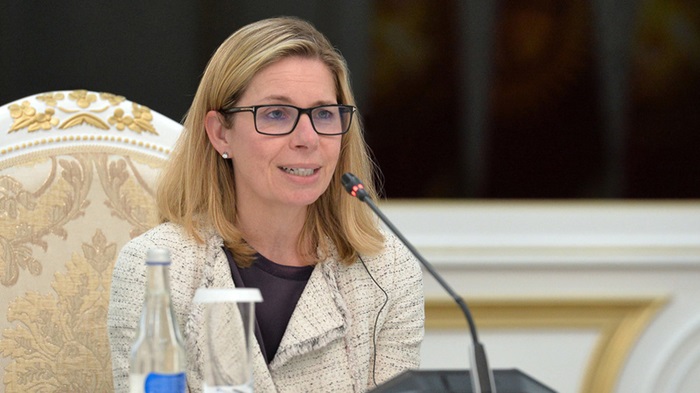
World Bank Managing Director for Operations, Anna Bjerde has encouraged the Government of Sri Lanka to stay the course on reforms for recovery and sustainable growth.
Concluding her four-day visit to Sri Lanka today, she also underscored the World Bank’s continuous commitment to investing in people, strengthening human capital, and creating jobs.
During the visit, Bjerde met with Sri Lanka’s President and Minister of Finance, Ranil Wickremesinghe, cabinet ministers, representatives of opposition parties, civil society, private sector, development partners, and World Bank project beneficiaries.
She participated in a roundtable hosted by the President with key ministers, private sector representatives, and development partners—including members of the MDB+ platform, which includes Multilateral Development Banks (MDBs) and bilateral development partners. The platform enables member institutions to coordinate their engagement with Sri Lanka. The roundtable focused on Sri Lanka’s progress on structural reforms, mobilizing private capital for development, supporting job creation, human capital development, and regional cooperation.
“As Sri Lanka recovers from a series of unprecedented shocks with devastating impacts, it is crucial to stay the course on sound and timely reforms to stabilize the economy while fostering economic growth that can attract investment, generate jobs, protect the poorest and most vulnerable, and build resilience to future crises. But equally important is the need to strengthen governance, citizen engagement, and social cohesion, a must for inclusive growth,” said Bjerde.
Her trip included visits to World Bank-supported projects in the Northern and North Central Provinces related to agriculture, health, climate change, private sector development, and financial inclusion for women.
“During my visit, I heard about the challenges Sri Lankans face. Skilled professionals are leaving the country, farmers are struggling to cope with a changing climate, and entrepreneurs are constrained by a lack of investment and access to credit. But I also saw huge opportunities to scale up climate-smart agriculture, harness renewable energy, boost entrepreneurship, promote competitiveness and regional connectivity,” added Bjerde. “The World Bank will continue to support Sri Lanka on its journey to recovery, connecting farmers to markets, strengthening access to healthcare, boosting innovation, pursuing transformation through infrastructure investments, and creating quality jobs for women and youth.”
The World Bank has been a partner to Sri Lanka for more than 70 years, providing financial and knowledge support to the country.
At the onset of the economic crisis in May 2022, the World Bank moved fast to help protect the people of Sri Lanka—particularly the poor and vulnerable—from the worst impacts by repurposing funds from the existing portfolio. In addition, the World Bank was one of the earliest responders to the crisis and initiated a coordination platform with the Asian Development Bank and the Asian Infrastructure Investment Bank to align emergency assistance to help sustain basic services and commodities. (NewsWire)
